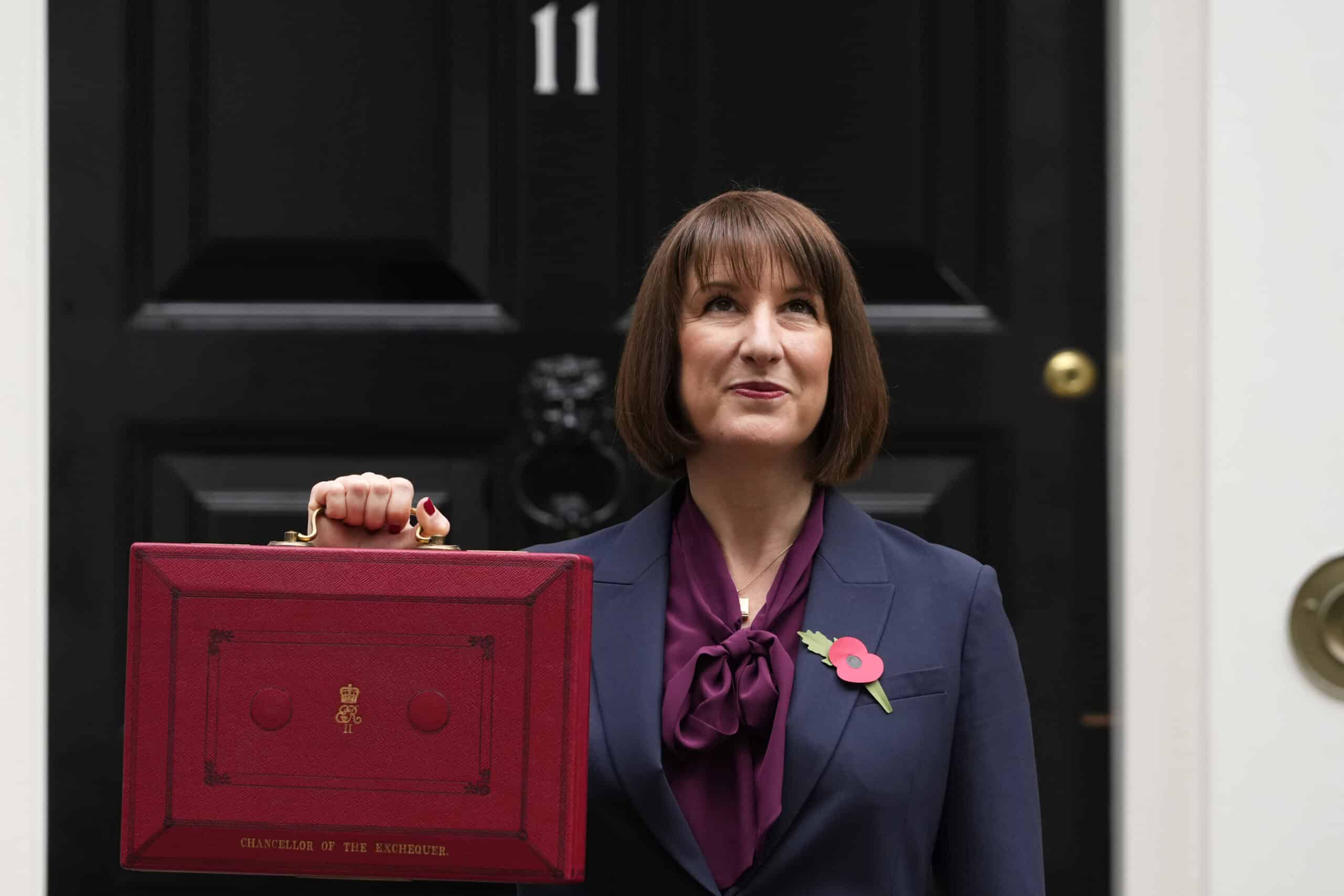

Britain’s Chancellor of the Exchequer, Rachel Reeves, looks up as she holds up the traditional red ministerial box containing her budget speech, as she poses for the media outside No 11 Downing Street, before departing to the House of Commons to deliver the budget in London, Wednesday, Oct. 30, 2024. (AP Photo/Kirsty Wigglesworth)
LONDON — British Treasury chief Rachel Reeves told lawmakers Wednesday that taxes will rise by 40 billion pounds ($52 billion) in order to plug a hole in the public finances and investment projects to boost growth.
In the Labour Party’s first budget since returning to power earlier this year for the first time in 14 years, Reeves said she will use the money to “invest, invest, invest” and get the economy growing.
Article continues after this advertisementReeves said the tax increases are needed because of the economic “black hole” left by the previous Conservative government.
FEATURED STORIES BUSINESS Alsons Dev expands with Nurtura, offering quality homes for young families BUSINESS BIZ BUZZ: Global brainstorming club coming BUSINESS How a Bible verse transformed my approach to personal finance“I am restoring stability to our public finances and rebuilding our public services,” she said.
READ: New UK finance minister Reeves vows to power economy
Article continues after this advertisementThe center-left party was elected July 4 after promising to banish years of turmoil and scandal under Conservative governments, get Britain’s economy growing and restore frayed public services.
Article continues after this advertisementThe budget could set the tone for the length of the current parliament, which runs until 2029, and the party’s ability to win a second term at the next election.
Article continues after this advertisementReeves faces a tough balancing act.
She pledged to put “more pounds in people’s pockets,” give a much-needed financial boost to public services, such as schools and hospitals, and get the economy growing.
Article continues after this advertisementAll this has to be done within the confines of stretched public finances, which the government has said are in a much worse state than thought when it was elected in July.
Prime Minister Keir Starmer has warned that the budget will reflect “the harsh light of fiscal reality” but that there will no return to the austerity that marked the early years of the previous Conservative government after it was first elected in 2010.
Reeves argued that higher taxes and limited public spending increases are needed to “fix the foundations” of an economy that it argues has been undermined by 14 years of Conservative government.
READ: UK finance minister vows to ‘rebuild’ country
The Conservatives say they left an economy that was growing, albeit modestly, with lower levels of debt and a smaller deficit than many other Group of Seven wealthy nations.
Pumping money into health, education and housing is a priority of the new government, made harder by a sluggish economy, hobbled by rising public debt and low growth. The government also says there is a 22 billion pound ($29 billion) “black hole” in the public finances left by the Conservative government.
Labour has pledged not to raise the tax burden on “working people,” a term whose definition has been hotly debated in the media for weeks. The Treasury has announced that about 3 million of the lowest-paid workers will get a 6.7% pay increase next year, with the minimum wage rising to 12.21 pounds ($15.90) an hour.
Reeves — Britain’s first female chancellor of the exchequer, a position that has existed for some 800 years — also said she is tweaking the government’s debt rules so that she can borrow billions more for investment in the health system, schools, railways and other big infrastructure projects, and to raise money by hiking tax paid by employers, though not employees.
“The U.K. is at a critical juncture: after years of sluggish growth and deteriorating public infrastructure, a sustained rise in government investment is vital to promote long-term growth and boost living standards,” said Monica George Michail, an economist at the National Institute of Economic and Social Research, an independent think tank.
Though the budget is set to be one of the most consequential in years, Reeves will no doubt be careful not to cause concern in financial markets. Two years ago, the short-lived premiership of Liz Truss foundered after a series of unfunded tax cuts roiled financial markets and sent borrowing costs surging.
Her successor Rishi Sunak sought to get a grip on the public finances but was unable to dislodge the notion that the Conservative Party had lost control of the economy, arguably the biggest reason why it suffered its worst election defeat in 200 years.
Subscribe to our daily newsletter
In the run-up to the budget statementnuebe gaming, the U.K.’s borrowing costs in the markets edged higher, suggesting there is some unease about the path ahead.
READ NEXT UK Treasury chief unveils budget with $50 billion in tax hikes US economy grew at solid 2.8% pace last quarter EDITORS' PICK Siargao hosts biggest tournament yet: 28th Siargao Int’l Surfing Cup QS5000 Number of fatalities due to Kristine and Leon rises to 145 Comelec reviews Vico Sotto’s letter vs rival, findings out next week ‘Antoway’: Bontoc’s unique mourning for the dead at risk of dying Comelec to set up repair hubs for election equipment nationwide Remembering our furry family: Filipinos honor deceased pets, strays MOST READ Comelec website uploads Con-Can of party-list group nominees Super Typhoon Leon to bring heavy rains over Northern Luzon LIVE UPDATES: Super Typhoon Leon LIVE: PBA Finals Ginebra vs TNT Game 2 October 30 Follow @FMangosingINQ on Twitter --> View comments

